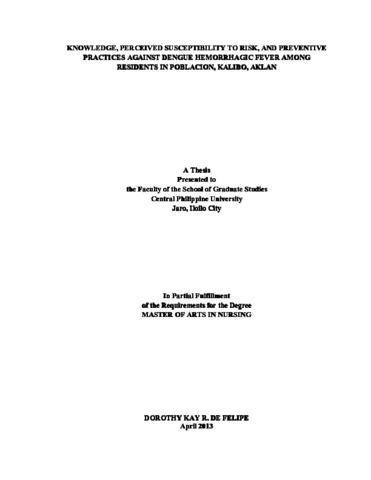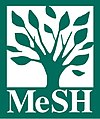Knowledge, perceived susceptibility to risk, and preventive practices against dengue hemorrhagic fever among residents in Poblacion, Kalibo, Aklan

Page views
1,397Date
2013Author
Thesis Adviser
Defense Panel Chair
Share
Metadata
Show full item record
Abstract
This study was conducted to determine the Knowledge, Perceived Susceptibility to Risk, and Preventive Practices against Dengue Hemorrhagic Fever among Residents in Poblacion, Kalibo, Aklan. Specifically, this study aimed to describe the personal characteristics of the residents in terms of age, sex, and educational attainment. It also aimed to determine the residents’ a) knowledge on Dengue Hemorrhagic Fever and its prevention, b) perceived susceptibility to risk, and c) preventive practices against Dengue Hemorrhagic Fever. Furthermore, this study aimed to determine the relationship between the residents’ knowledge on Dengue Hemorrhagic Fever and its prevention and preventive practices when their perceived susceptibility to risk is controlled.
This is a descriptive-correlational study which employed a one-shot survey whereby information or data were collected only once. The respondents were a sample of 348 residents aged 19 to 50 years old of Poblacion ,Kalibo, Aklan. There were selected using cluster sampling technique. One resident from each household was interviewed utilizing the interview guide. In measuring univariate data, descriptive statistics such as frequency, percentage, and mean were used. However, to determine the relationship between major variables, Gamma and Chi-square tests were employed.
This study revealed that more than one-half of the residents were 21 to 35 years old and females. Three-fourths of them attained college level education.
In terms of the residents’ level of knowledge on Dengue Hemorrhagic Fever and its Prevention, little more than half of the residents interviewed were “moderately knowledgeable”. However, less than half of them correctly answered that “those mosquitoes that transmit the dengue virus do not lay eggs in dirty water”.
The findings further showed that most of the respondents had “high risk- susceptibility perception” in terms of its seriousness, personal factors, and prevention.
In terms of preventive practices against Dengue Hemorrhagic Fever of the residents, a little less than half of the residents had “good preventive practices”. On the other hand, less than half of them “always” empty gutter from rainwater and only a few of them “sometimes” and “never” practiced this. Also, almost half of the residents claimed that they avoid and do not encourage fogging “sometimes”.
Moreover, there was no significant relationship between personal characteristics in terms of age and sex and the level of knowledge on Dengue Hemorrhagic Fever and its prevention and on their perceived susceptibility to risk. Educational attainment was found to have influence on the respondents’ level of knowledge and perceived susceptibility to risk. The higher the level of education attained, the more knowledgeable the residents were and the higher their perception to risk. The study also revealed that the age of the residents was a contributory factor in their preventive practices which means that the older the respondents, the more they complied with the different preventive practices against Dengue Hemorrhagic Fever compared to the younger ones. However, there was no significant relationship between personal characteristics such as sex and educational attainment and preventive practices of the residents.
The relationship between the level of knowledge of the residents on Dengue Hemorrhagic Fever and its prevention and their perceived susceptibility to risk was found to be highly correlated and significant at 0.05 level. The more knowledgeable the residents are, the higher their risk perception of being susceptible to the disease.
Furthermore, no significant relationship was found between the level of knowledge and preventive practices of the respondents against Dengue Hemorrhagic Fever and between their perceived susceptibility to risk and preventive practices.
No significant relationship was also found between knowledge on Dengue Hemorrhagic Fever and its prevention and preventive practices of the residents when their perceived susceptibility to risk was controlled. This means that knowledge was not a contributory factor to preventive practices even when perception to risk-susceptibility is controlled.
Based on these findings, help and guidance from health care providers and support and programs from concerned organizations were recommended in order to sustain and further enhance the knowledge and preventive practices against Dengue Hemorrhagic Fever.
Description
Abstract only
Suggested Citation
De Felipe, D. K. R. (2013). Knowledge, perceived susceptibility to risk, and preventive practices against dengue hemorrhagic fever among residents in Poblacion, Kalibo, Aklan (Unpublished Master’s thesis). Central Philippine University, Jaro, Iloilo City.
Type
ThesisSubject(s)
Keywords
Department
School of Graduate StudiesDegree
Master of Arts in NursingShelf Location
GSL Theses 610.73072 D361
Physical Description
xiv, 86 pages



